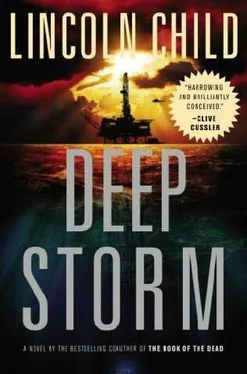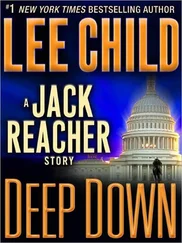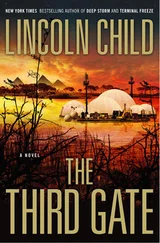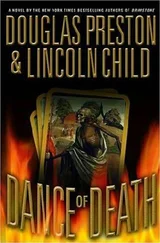At that moment, he heard a strange sound. It was low, almost at the threshold of audibility, and it seemed to come from far below. It sounded as if the earth itself was crying out in pain. The escape pod trembled in a way that had nothing to do with their rapid ascent.
There was a sudden confusion of shouts and groans. Beside him, Hui suddenly raised a hand to her face. "My ears," she said.
"Change in air pressure," Crane told her. "Try swallowing or yawning. Or the Valsalva maneuver."
"The what?"
"Pinch your nose and shut your mouth, then try forcing air through your nostrils. It helps equalize the pressure in your ears."
He glanced downward through the porthole again, searching for the source of the strange roar. The welter of bubbles had cleared and he could just make out the curve of the dome, already hundreds of feet below them now, its cluster of lights like the faintest of stars in a black sky. As he watched, they faded from view, and all was dark.
Then-just as he was about to look away-an explosion of light came from below.
It was almost as if the entire ocean had suddenly been illuminated. Crane had a brief vision of the sea floor-stretching away in all directions like a grayish lunar plain. Countless bizarre and alien-looking deepwater fish hung below him. Then the brightness became too intense and he had to turn away.
"What the hell ?" he heard Vanderbilt say.
The porthole was like a lightbulb, bathing the inside of the escape pod in brilliant yellow. But even as he looked, Crane noticed that the light was beginning to fade. More sounds came from below now: sharp booms and rat-a-tats like a legion of enormous fireworks. He leaned forward again, squinting into the porthole. He caught his breath.
"Oh, my God," he breathed.
In the light reflecting upward from the ocean floor, he could just make out the dome. It had been abruptly blown open, peeled back like a banana. Inside it, he could see unearthly flashes of red and brown and yellow, a furious cascade of explosions as the Facility tore itself apart.
And there was something else: a massive shock wave-roiling and churning like a living thing-boiling upward toward them at a furious rate.
He sat up instantly, grabbing Hui Ping with one hand and the safety railing with the other. "Brace for impact!" he yelled.
A moment of terrible anticipation…and then the pod was abruptly thrown on its side, nearly upended by the force of the wave. There were cries, screams. The lights went out, and the only illumination was the dying yellow light from below. Crane clung grimly to Hui as they were shaken violently back and forth. Someone went tumbling across the cabin, colliding with a safety railing and sinking to the floor with a groan. More screams, shouts for help. There was a popping sound, then a hiss of water.
"Seal that breach!" Vanderbilt shouted to the tech above the tumult.
"What is it?" Hui asked, her face pressed against Crane's shoulder.
"I don't know. But those active controls you were asking about? I think Korolis might have just run into them."
"And-and the Facility?" she asked.
"Gone."
"Oh, no. No, no . All those people…" Softly, she began to weep.
Slowly, the buffeting abated. Crane glanced around the dim space. Many were sobbing or moaning; others, frightened and agitated, were being restrained and comforted by their neighbors. There seemed to be only one casualty: the man who had tumbled across the cabin. Gently, Crane freed himself from Hui and went to tend him.
"How much farther?" he called out to Vanderbilt.
The oceanographer had risen to help the tech deal with the breach. "Unknown," he called back. "Power's out; all systems have failed. We're rising on our own buoyancy now."
Crane knelt before the injured man. He was dazed but conscious, struggling to get up. Crane helped him to a sitting position, then dressed a nasty gash across his forehead, another on his right elbow. The light from below had faded completely now, and the escape pod was pitch black. Crane felt his way through ankle-deep water back to Hui.
As he took a seat, he felt someone else move past him in the dark. "We can't seal the breach," came Vanderbilt's voice. "We'd better hope we reach the surface soon."
"Eight minutes have passed already," the tech said. "They must have."
Even as he spoke, Crane noticed-or thought he noticed-the oppressive blackness of the cabin giving way to the faintest light. He felt Hui press his hand: she had noticed it, too. The headlong upward rush seemed to slow, then falter. A lambent light began to suffuse the cabin, flickering in patterns of green and deep blue.
And then came a sensation that was unmistakable. They were bobbing in a gently rolling swell.
A ragged cheer erupted across the escape pod. Hui was still weeping, but now, Crane realized, they were tears of joy.
Vanderbilt waded through the water to the escape hatch in the roof of the pod. But even as he did so there was a muffled shout from above. The clatter of footsteps sounded on the roof; the handle of the hatch turned; there was a metallic squeal as it was raised.
And then Crane saw-for the first time in almost two weeks-bright sunlight and a brilliant blue sky.
There was a confusion of rooms and cubicles, murmured questions. Someone shone a bright light into his left eye, then his right. A heavy terry cloth robe was draped over his shoulders. And then-full circle, as in a dream-Crane found himself back in the Storm King library, alone, facing the same computer monitor he had faced twelve days ago, the afternoon he first arrived.
He licked his lips. Perhaps it was a dream; perhaps none of this had happened. It had all been some fabulous mental confection that started out full of light and promise but slowly devolved into nightmare. And now consciousness would return; bits and fragments of the illusion would fall away like chunks of an old facade; reason would reassert itself; and the entire structure would be revealed for the preposterous dreamscape it really was.
Then the monitor winked into life, revealing a tired-looking man in a dark suit, wearing rimless glasses and sitting at a desk. And Crane knew that this, in fact, was no dream.
"Dr. Crane," the man said. "My name's McPherson. I understand Admiral Spartan gave you my card."
"Yes."
"And you're alone?"
"Yes."
"Why don't you begin at the beginning, then? Leave nothing out."
Slowly-methodically-Crane related the events of the last two weeks. For the most part, McPherson merely listened, motionless, but the occasional question he posed made it clear that much of what he was hearing was not entirely new to him. As Crane's recitation neared its end-the vindication of Asher's theory, the actions of Korolis, the final meeting with Spartan-McPherson's tired face grew even wearier. The bags beneath his eyes seemed to grow darker, and his shoulders sagged.
Crane stopped speaking, and for a time the room fell into a profound silence. At last, McPherson roused himself. "Thank you, Dr. Crane." He reached toward a control box that sat beside him, preparing to break the video connection.
"Just a minute," Crane said.
McPherson glanced back at him.
"Can't you tell me anything about the saboteurs? I mean, why would anybody do something like this?"
McPherson gave him a weary smile. "I'm afraid there are many reasons somebody would do such a thing, Dr. Crane. But to answer your question, yes, I can tell you a little. You see, we'd been tracing their lines of communication, just as Marris was planning to do. And just an hour ago, an arrest was made on Storm King."
"Here?" Crane said. "On the oil rig?"
"Dr. Bishop's contact. We don't know everything yet, but we know we're dealing with a cadre of ideologues, fiercely opposed to American interests and dedicated to neutralizing our ability to protect ourselves. Their members are mostly recruited out of colleges and universities, much as Kim Philby, Guy Burgess, and the other Cambridge spies were recruited-young people, impressionable and full of high ideals, who can easily be influenced and preyed upon. The group is very well financed, whether by a foreign government or private individuals we're not yet sure. But we'll find out soon enough. Either way, they were committed to preventing us from taking possession of whatever technology was buried down there."
Читать дальше












